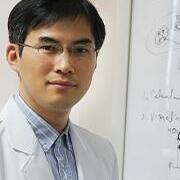Professor of Nuclear Medicine, Yonsei University College of Medicine, South Korea
Department of Radiology and Psychiatry, Biomedical Science & Engineering, Mayor of the Graduate School, Yonsei University Medical Science
LMI: 2002 -2003
Dr. Hae-Jeong Park is a Professor of the Department of Nuclear Medicine, Department of Radiology and Psychiatry, Biomedical Science & Engineering major of the graduate school at Yonsei University Medical Science, Yonsei University College of Medicine, South KOREA.
Dr. Park received a B.S. degree in Electrical Engineering in 1993 and M.S. and Ph.D. degrees in Biomedical Engineering from Seoul National University in 1995 and 2000. During his doctorial study, he worked for signal processing and expert system for automated sleep stage classification using EEG. During his postdoctoral study in 2001 at the Clinical Cognitive Neuroscience Center, Seoul National University, he pioneered a statistical parametric mapping of distributed source current densities of high resolution event-related potential (CdrSPM), and proposed an independent component analysis for cross-sectional positron emission tomography images (PETICA). In 2001, Dr. Park joined the Clinical Neuroscience Division of the Laboratory of Neuroscience at Harvard Medical School, directed by Dr. Robert W. McCarley, and Surgical Planning Laboratory, Department of Radiology, Brigham and Women's Hospital, Harvard Medical School, supervised by Drs. Martha Shenton and Carl-Fredrik Westin. At Harvard as a research fellow, he researched fiber tracking and quantification of diffusion tensor imaging (DTI) for basic and clinical neuroscience. He was the first to introduce the whole-brain fiber tractography, which was novel at the time and was chosen as the cover page for the Neuroimage journal in 2003. His whole-brain tractography figures have appeared in several review papers, magazines and book covers in the early years of DTI. He also proposed an automated fiber extraction by integrating whole brain fibertractography and anatomical gray matter parcellation and fMRI, which were summarized into a MATLAB-based software tool in 2003, DoDTI (http://neuroimage.yonsei.ac.kr/dodti).
Since 2004, Dr. Park has worked as an Assistant and Associate Professor of Department of Radiology and joined Department of Nuclear Medicine, newly launched in 2012, at Yonsei University. He has introduced cortical-surface analysis of PET, hierarchical ICA for subcortical parcellation using resting state fMRI,Graph-ICA, real-time fMRI neurofeedback and real-time hyperscanning fMRI and several neuroimage processing algorithms.
During 2012-2013, he took a year-long sabbatical year as an honorary visiting research fellow at Wellcome Trust Centre for Neuroimaging, University College London, UK, where he studied theoretical neurobiology at Dr. Karl Friston's Lab and computational psychiatry at Dr. Read Montague's Lab.
Dr. Park is currently the Director of the Laboratory of Molecular Neuroimaging Technology (MoNET) where he tries to interface basic and clinical neuroscience through the use and development of multimodal neuroimaging technologies and computational modeling.
His research interests are:
1. Integrating systems and theoretical neurosciences to model neuro-cognition mechanism.
2. Understanding brain organization using multimodal human connectome (fMRI, DTI, sMRI, TMS, PET, EEG, MEG).
3. Reading mind and facilitating network reorganization using real-time fMRI and brain decoding.
4. Understanding linguistic, communicative and social brains in the respect of Bayesian inference.
5. Medical image processing, registration and segmentation for surgical planning and medical diagnosis.

